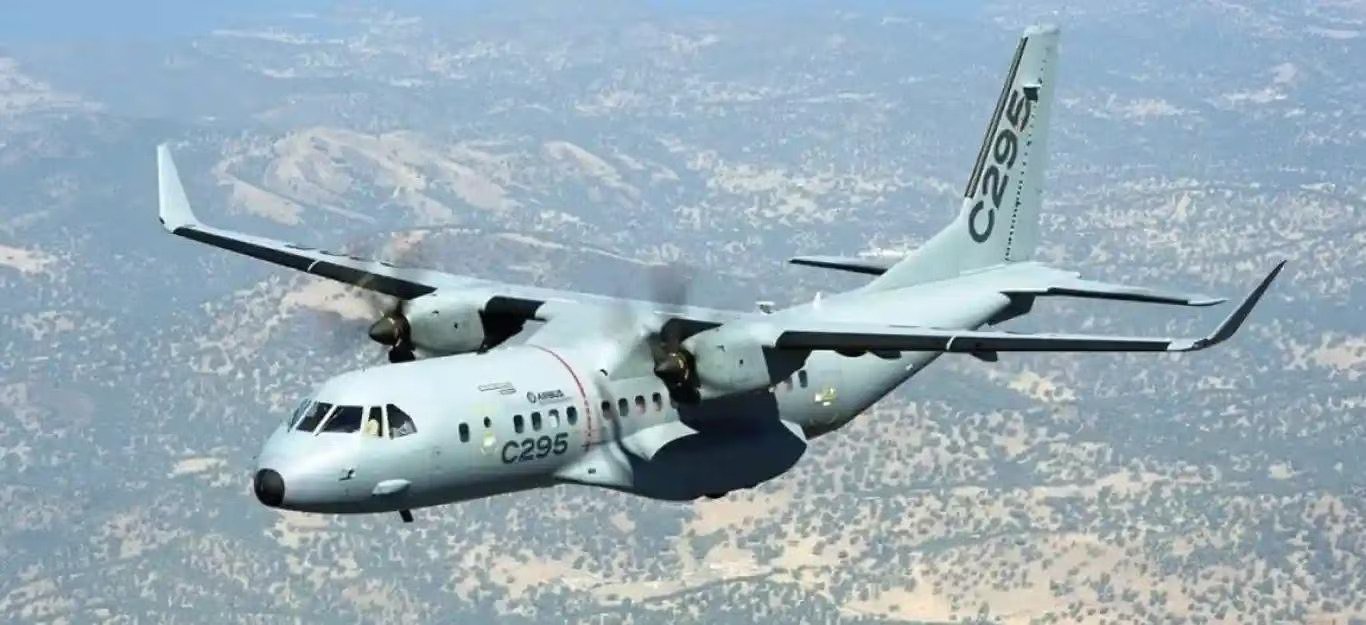1. A Tactical Boost to India’s Defense with the C295
The induction of the C295 aircraft into the Indian Air Force (IAF) provides a significant upgrade to India’s tactical airlift capabilities. This aircraft is highly versatile, capable of supporting missions such as:
- Troop and cargo transport
- Medical evacuation and disaster relief
- Maritime patrol along strategic borders
Designed to operate on short and unpaved runways, the C295 can easily navigate challenging terrains, including along the Line of Actual Control (LAC) with China. With the ability to carry nine tons of cargo, 71 soldiers, or 48 paratroopers, it offers the IAF unmatched flexibility.
Replacing the ageing Antonov An-32 and Avro 748 aircraft, the C295 modernizes India’s tactical airlift operations. Its additional capabilities, such as electronic signals intelligence and air-to-air refueling, make it indispensable for both military and humanitarian missions.
2. Strengthening ‘Make in India’ and Atmanirbhar Bharat Initiatives
The C295 project plays a pivotal role in India’s quest for self-reliance in defense production. As part of the project, 56 aircraft will be delivered, with 16 built in Spain and 40 assembled in India by Tata Advanced Systems Limited (TASL).
The first ‘Made in India’ C295 aircraft is expected to roll out in September 2026, with the remaining units delivered by August 2031. This assembly marks India’s first private-sector aircraft manufacturing plant, reinforcing the Atmanirbhar Bharat initiative to reduce reliance on imports C295 aircraft India.
3. Generating Jobs and Growing India’s Aerospace Ecosystem
The establishment of the C295 production facility in Vadodara represents a significant economic boost, generating employment and nurturing a skilled workforce.
- 3,000 direct jobs and 15,000 indirect jobs will be created through the project.
- The assembly of each aircraft requires over 1 million labor hours, offering hands-on experience to Indian workers.
- The project will diversify India’s aerospace industry, traditionally concentrated in cities like Bengaluru and Hyderabad.
The ripple effect of this initiative will benefit ancillary industries, including those providing aircraft components and logistical support. The collaboration with TASL and other suppliers promises to create a robust aerospace supply chain.

4. Building India’s Aerospace Infrastructure and Capabilities
The C295 project extends beyond aircraft manufacturing—it includes the development of comprehensive training and maintenance infrastructure.
- Training facilities will equip IAF personnel to operate and maintain the C295 fleet.
- Maintenance depots will be established to ensure smooth operations and uninterrupted support.
A Stick Holding Depot in Prayagraj and a Training Centre at Agra will further bolster India’s aerospace infrastructure. This expansion lays the groundwork for civil and military aviation capabilities, reducing the dependence on foreign players like Boeing and Airbus.
5. Paving the Way for Aviation Exports
The C295 project isn’t just focuse on meeting India’s defense needs—it also positions India as an exporter in the global aerospace market.
After the delivery of the 56 aircraft to the IAF, Airbus will allow to sell the aircraft manufacture in India to civil aviation operators and export them to other nations, pending approval from the Government of India. This aligns with the ‘Make in India, Make for the World’ initiative,
signaling India’s readiness to compete in a market long dominated by European and American manufacturers.
Prime Minister Narendra Modi emphasized that this project could lead to the production of India’s first civil aircraft, further bolstering India’s aerospace ambitions.
Conclusion
C295 aircraft India, The inauguration of the Tata-Airbus C295 manufacturing plant in Vadodara marks a defining moment in India’s pursuit of aerospace excellence. By delivering advanced military transport capabilities, boosting local manufacturing, and generating employment,
the project exemplifies the spirit of self-reliance and innovation. As India prepares to export aircraft and build a globally competitive aerospace industry,
the C295 project stands as a testament to India’s ambitions to lead on the world stage.







